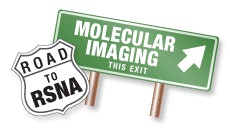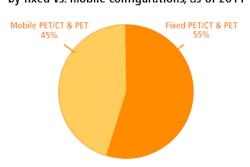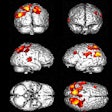At this year's annual RSNA meeting, the advance of hybrid imaging and the development of new imaging agents are expected to be among the most intriguing developments in molecular imaging and nuclear medicine in Chicago.
PET/MRI, which took RSNA 2010 by storm a year ago, will continue to show its potential in a number of clinical applications, including the detection of hypermetabolic lesions. Dr. Alexander Drzezga, from Technische Universität München, is scheduled to detail results of the first clinical comparison between simultaneous whole-body PET/MRI and PET/CT to characterize lesions in patients with oncological diagnoses (Wednesday, November 30, 10:40 a.m.-10:50 a.m., SSK13-02, Room S505AB).
One other significant trend in molecular imaging is an increasing number of multimodality and multitracer imaging studies. Dutch researchers will show promising early results for two novel molecular imaging techniques to detect and manage lymph node metastases in prostate cancer patients. The group from Radboud University Nijmegen is evaluating ferumoxtran-10-enhanced MRI (MR lymphography) and carbon-11 choline PET/CT to assess the number, size, and location of lymph node metastases (Monday, November 28, 11:20 a.m.-11:30 a.m., SSC09-06, Room S504CD).

At the Lakeside Learning Center, RSNA 2011 will offer daily molecular imaging educational exhibits that include PET imaging of receptors in oncology (LL-MIE1261), nuclear molecular imaging of tumor hypoxia (LL-MIE1264), molecular imaging of apoptosis (LL-MIE2456), and PET tracers beyond FDG for imaging prostate cancer (LL-NME1248).
Other PET and molecular imaging exhibits will feature the new PET Response Criteria in Solid Tumors (PERCIST) lexicon, and there will be a nuclear medicine case of the day (LL-EDE101) at the Lakeside Learning Center.
Among the array of refresher courses is "Brain Imaging Workup for Dementia: FDG-PET, Amyloid PET, and MR Imaging" (Sunday, November 27, 2:00 p.m.-3:30 p.m., RC111, Room E451A). The forum will focus on the roles of PET and MRI in diagnosing dementia and cognitive disorders. The course is designed for physicians and researchers involved in PET imaging of dementia.
Also on Sunday, attendees can learn about the "Essentials of Molecular Imaging and Systems Diagnostics for Clinical Radiologists" (2:00 p.m.-3:30 p.m., RC117, Room E352). The session will cover the definition of molecular imaging, how it is currently practiced, how it differs from conventional diagnostic imaging, and the value of modality fusion. One section will cover the role of molecular imaging in drug development.
An interactive session, titled "Improving PET Interpretation: Present Updates in Head and Neck Cancer and New Horizons with Case Examples," will highlight Tuesday's refresher courses (November 29, 8:30 a.m.-10:00 a.m., RC311, Room S402AB). The use of FDG-PET/CT and fluoro-L-thymidine (FLT) PET to understand the metabolism of normal cells, cancer cells, and cell dynamics will be discussed. Also on the agenda is a discussion of the pros and cons of both modalities for initial staging and treatment response in head and neck cancer.
Below are even more highlights from a multitude of worthwhile molecular imaging and nuclear medicine scientific papers scheduled for presentation at RSNA 2011.
To view the complete RSNA scientific program and abstracts, visit the conference's website.




















